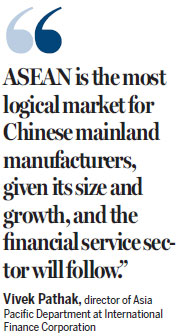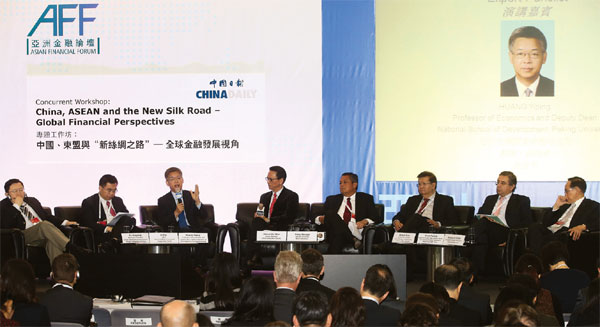China, ASEAN economic bonds set to strengthen
Updated: 2015-01-21 05:31
By Emma Dai in Hong Kong(HK Edition)
|
|||||||||
|
Financial leaders and academics share their views at a China Daily roundtable workshop on Tuesday, focusing on the opportunities offered for investors with the creation of the New Silk Road markets. Roy Liu / China Daily |
China and ASEAN (Association of Southeast Asian Nations) countries are to benefit each other from increased economic cooperation and integration with the creation of the 21st Century Maritime Silk Road - one of China's most significant and latest national strategies - a China Daily Roundtable conference on the region's economic development outlook heard on Tuesday.
"Asia today is on the threshold of a momentous era in economic development and advancement, with China having taken the lead in pushing a string of initiatives that are aimed at not only linking up the whole of Asia, but also giving the continent the impetus it desperately needs to spur growth after a period of global economic stagnation and uncertainties," Zhou Li, publisher and editor-in-chief of China Daily Asia Pacific, said in his welcoming address at the panel session entitled "China, ASEAN and the New Silk Road - Global Financial Perspectives" as part of the Asian Financial Forum (AFF) in Hong Kong.
"The New Silk Road illustrates the development of Asia. It connects the world's second-largest economy with 600 million people of the ASEAN economic community. This new dynamic project has the ability to create a tremendous amount of change in finance and business, in which Hong Kong is well positioned to tap the opportunities," stressed Raymond Yip, deputy executive director of the Hong Kong Trade Development Council, the organizer of AFF - one of the most important annual events on the global financial calendar.
Xu Ningning, executive president of the China-ASEAN Business Council, affirmed that Hong Kong has its special advantages in the development of the New Silk Road, including its strategic geographic location and its natural connection with ASEAN countries (The Association of Southeast Asian Nations), as well as the Chinese mainland, not to mention its strength in financial services.
"The end of this year is expected to witness the establishment of the ASEAN Economic Community, which the New Silk Road will help to promote. It could be the first stop of Chinese outbound investment. Meanwhile, China can also support infrastructure construction to solve the imbalance within ASEAN," Xu said.

"We estimate that ASEAN will become world's fourth-largest economy by 2050. But demand for infrastructure investment is huge," said Perry Warjiyo, deputy governor of Bank Indonesia.
"We are opening up for investments and make the economy more market driven. During the next five years, in Indonesia alone, we will build 15 new airports, 24 ports and over 3,000 kilometers of highways. An estimated $450 billion is needed for all these projects and more. We are looking for closer cooperation with other countries, including China and the US," he said.
While working together to update infrastructure in ASEAN member states, the New Silk Road will also help to keep the South China Sea peaceful, said Tan Sri Dr Michael Yeoh, chief executive officer of Malaysia's Asian Strategy and Leadership Institute.
"The setting up of various offshore renminbi clearing centers in ASEAN will deepen its connectivity with China and make the economy stronger," Yeoh said.
Identical views were expressed by China-ASEAN Investment Cooperation Fund Chief Executive Officer Li Yao, who said that linking China and ASEAN markets together, the New Silk Road will promote the circulation of capital flow, technology and goods in the region, facilitating sustainable growth in the long term.
Vivek Pathak, director of Asia Pacific Department at International Finance Corporation, told the session that due to the demand to diversify asset location and expand Chinese brands, capital outflow from China will be the key phenomenon for the next decade. "ASEAN is the most logical market for Chinese mainland manufacturers, given its size and growth, and the financial service sector will follow," he said.
(HK Edition 01/21/2015 page8)
